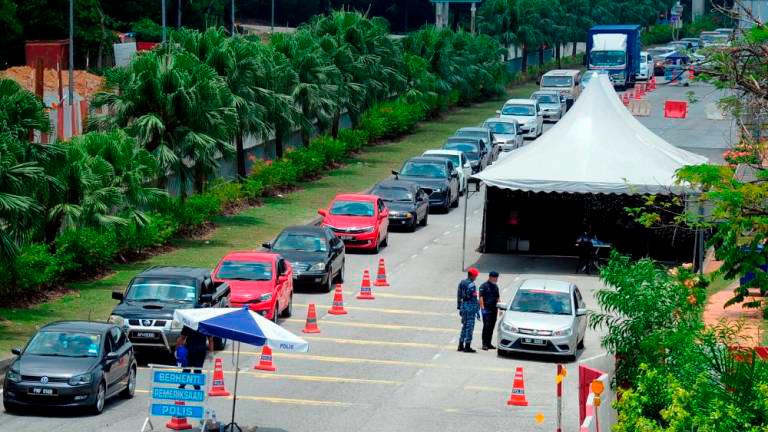Since the conditional movement control order (CMCO), lives and livelihoods are saved after the government decided to reopen the economic sectors to commence the recovering journey from an unprecedented crisis. But as individuals gradually resume daily activities, some people seemed too complacent to adhere fully to the standard operating procedures (SOP).
The SOP, which accompanied the re-opening of the economy, has resulted in some positive developments in Malaysia which include the following:
> The performance indicator of manufacturing sector, IHS Markit headline Purchasing Managers’ Index (PMI), which registered 50 in July with new orders, surpassing expectations;
> Total trade grew 2.2% on a year-on-year basis in June (-27.8% in May) with export growth of 8.8% (-25.5% in May) and import declining at a much slower pace of 5.6% (-30.4% in May). Trade balance also expanded to RM20.9 billion compared with RM10.4 billion in May;
> The industrial production index (IPI) surged to a double-digit growth of 18.2% on a month-on-month basis in May with expansion in all sectors; and
> The sales of wholesale and retail trade expanded by 26.3% on a month-on-month basis in May after recording a decline in April.
Therefore, the relaxation order imposed by the government should be seen as one of the main catalysts in boosting the economic growth of Malaysia.
Nonetheless, many appear to have taken this decision lightly, resulting in the emergence of new clusters making a total of 21 clusters as of Aug 4.
Some were triggered by imported cases as those who were infected did not comply with the home surveillance order (HSO) while some were detected at immigration depots.
For instance, there was a new cluster reported in Kedah, known as the Sivagangga cluster, which was triggered by a Malaysian resident who came back from Sivagangga, India but did not adhere to the HSO.
The result for a repeated Covid-19 test was positive and to make matters worse, he had contacts with other people during the HSO period.
As we begin to take a breather with a stretch of daily single-digit cases, the latest health development does not seem to provide a rosy signal.
The government’s previous decision to reopen the economy comes with a condition – for people to adhere strictly to the SOP.
These new clusters have led to the imposition of an enhanced MCO (EMCO) in some localities, and schools also have to be closed.
The actions have disrupted businesses and learning at schools. Many are paying the price for ignoring the SOP.
Is there a possibility of a complete re-imposition of the MCO? Well, it is not impossible.
Even Health Director-General Datuk Seri Dr Noor Hisham Abdullah specifically mentioned on July 29 that a rise in local transmissions can lead to the reinforcement of the MCO or CMCO.
Let’s glance through some countries or cities that are under a second round of lockdown measures caused by new waves of Covid-19 infections.
Melbourne city is back to a six-week lockdown beginning Aug 2 after experiencing a second wave of new cases.
The announcement resulted in the halt to businesses related to retail, manufacturing and administration sectors.
The Philippines capital, Metro Manila, is under a strict lockdown known as modified enhanced community quarantine (MECQ) for the next two weeks beginning Friday.
During the MECQ, only a limited number of businesses are allowed to operate and public transport has been shut down.
In the UK, the earlier plan to ease lockdown measures in Leicester on July 4 was cancelled in June after the city accounted for 10% of the overall positive cases in the country.
So, if the MCO or CMCO were to be reinstated in Malaysia, it would again be a big blow to the rakyat and businesses, and this will be a great hindrance to experiencing a V-shaped recovery that we have hoped for.
Business disruptions would worsen the state of unemployment which had already reached 5.3% in May.
Based on the Employment Insurance System’s latest unemployment benefit claims data, employment losses went up by 4.5% in the fourth week of July to 65,066 compared with 62,247 in the preceding week.
Although there are jobs being offered concurrently, there are people still losing their jobs and it could deteriorate should the MCO or CMCO be reinstated.
Furthermore, the re-imposition of the MCO or CMCO will also affect access to education by students due to digital barriers namely internet access, particularly those who live in rural areas.
Based on an official survey done in 2019, internet access by households stood at 90.1%, suggesting that there are households with limited access or no access to the internet at all.
This was one of the issues emphasised by participants in Sabah during the EMIR Research focus group discussion for our upcoming quarterly poll.
Lastly, should the MCO or CMCO be reinforced, inter-state travel would also be banned thus wasting ongoing efforts to boost domestic travel and spending. So, these are some of the pertinent points to think about.
As government stimulus packages such as Prihatin and Penjana begin to bear fruit in alleviating the rakyat’s burden and worries, cooperation from each individual in society is crucially needed for us to fight the invisible enemy together effectively. Thus, the keyword is social responsibility.
Every rakyat is responsible in ensuring that the MCO or CMCO is not reinstated for the sake of livelihood and the economy.
Sofea Azahar is research analyst at EMIR Research, a think tank focused on strategic policy recommendations based on rigorous research. Comments: letters@thesundaily.com










